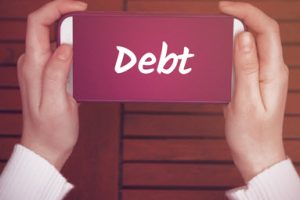Eliminating Debt Through Bankruptcy

It would be nice if bankruptcy was a magic wand that instantly discharged all consumer debts. After all, bankruptcy is a fresh start, and people cannot obtain this fresh start while still saddled with debts they cannot pay.
Alas, the world does not work that way, largely because moneylenders have financial rights as well, and federal laws protect these rights. Therefore, the type of debt has a great deal to do with the dischargeability, or non-dischargeability, of that obligation.
Private Debts
When times get tough, many people use credit cards for food, gas, utility bills, and other necessary expenses; most landlords and banks do not accept credit cards for rent and mortgage payments. But for the most part, people typically use credit to buy non-essential items.
All that being said, the credit card companies bear some responsibility if the borrowers default on the cards and declare bankruptcy. Some firms are rather notorious for issuing cards to people who can only barely afford to repay the loans. Furthermore, credit card companies earn over $150 billion a year, so despite what they may say, a few thousand dollars is not a major loss, especially since it may be a tax write-off. When taken together, all these factors mean that although the charges are clearly the individual’s responsibility, the company is hardly a “victim.”
Medical bills are in basically the same boat, which is why they are 100 percent dischargeable as well, at least in most cases. Providers usually charge uninsured patients much higher fees than they charge insurance companies, so it is little wonder that almost 43 million Americans have at least one unpaid medical bill.
Dischargeable Public Debts
Although they are government-guaranteed, Small Business Administration loans are generally dischargeable in bankruptcy. However, if the SBA loan included a security interest or a property lien, bankruptcy does not extinguish the lien or security interest, because bankruptcy judges do not have that power.
Income taxes are also dischargeable in bankruptcy, and since the Bankruptcy Code does not define “income taxes,” the IRS or other taxing authority usually has the final say on what debts qualify for discharge and which ones do not. Regardless, the following rules apply:
- – The debt must be at least three years old,
- – The returns must have been on file for at least two years, and
- – The debt has not been “assessed” in the last 240 days (basically, that means that the taxing authority has not sent the taxpayer a collection notice in the last nine months).
Similar to SBA loans, bankruptcy discharges the debt but does not extinguish any existing lien.
As discussed in a previous post, student loans are technically dischargeable in bankruptcy actions, though it is not easy to do so, under the draconian Brunner Rule. That is why some federal appeals courts have abandoned this rule and replaced it with a more lenient totality-of-the-circumstances test. Given the split in the circuits, and the ongoing student loan “crisis,” the Supreme Court may eventually weigh in and settle the matter.
Non-Dischargeable Public Debts
Domestic Support Obligations are almost never dischargeable in bankruptcy, because most DSO recipients are not wealthy governments, hospitals, or credit card companies, and they have substantial financial rights that all courts recognize, including bankruptcy courts. Bankruptcy probably will suspend legal proceedings in this area, such as motions to enforce or other collections proceedings, as well as wage garnishment. If the government has placed a lien on a financial account, bankruptcy may be able to release the lien, at least temporarily.
Count on Experienced Lawyers
Most types of debt are dischargeable in bankruptcy. For a free consultation with an experienced bankruptcy lawyer in Chicago, contact the Bentz Holguin Law Firm, LLC. Our law office has a small town atmosphere and access to nationwide resources.
modernhealthcare.com/article/20141211/news/312119987


